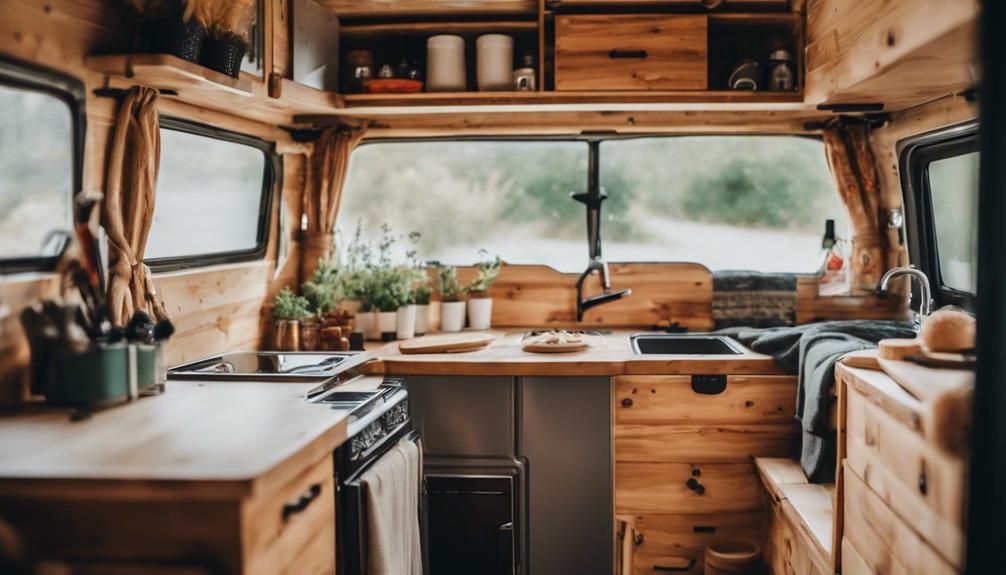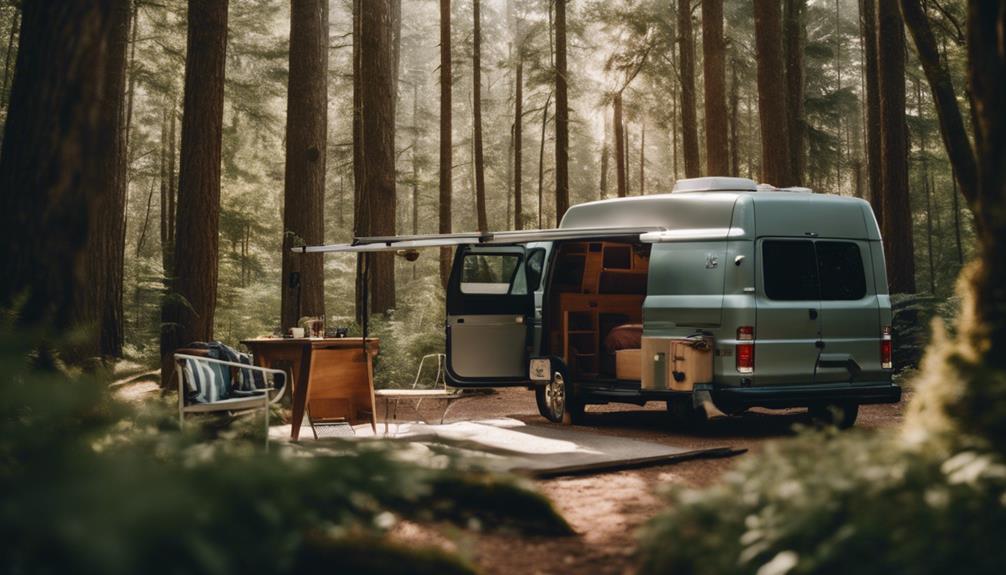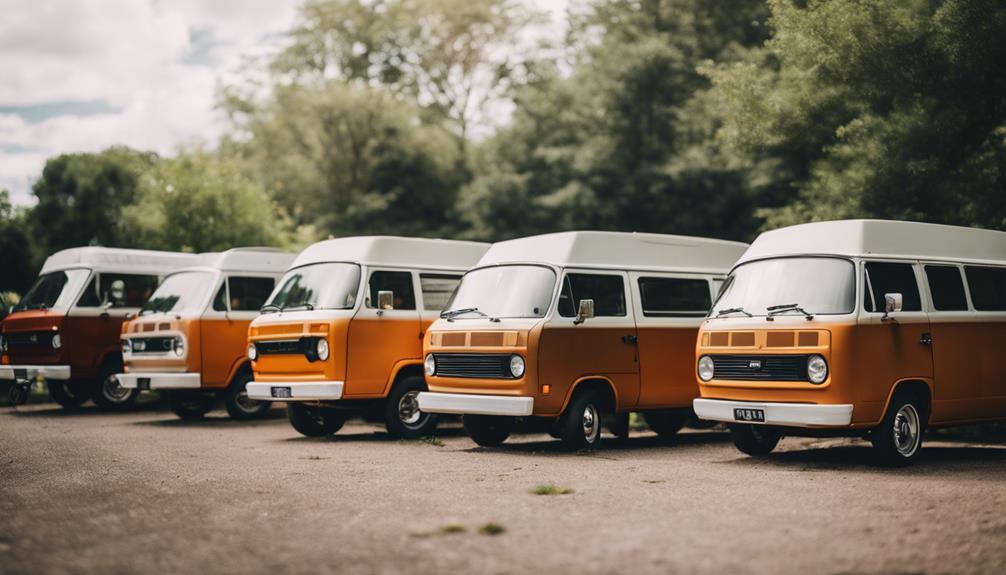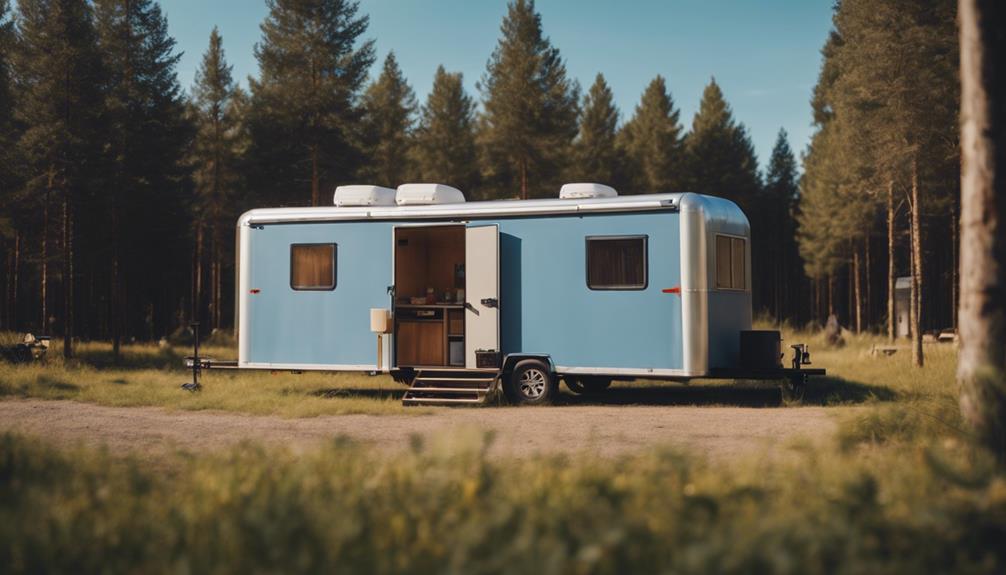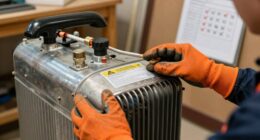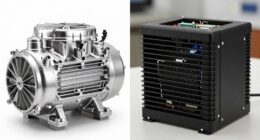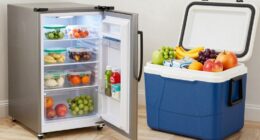Choosing the best van for your DIY camper conversion is key to building your dream camper. Popular options like the Mercedes Sprinter, Ford Transit, and Ram ProMaster each provide unique benefits. The Sprinter's spacious interior is great for comfort, while the Transit offers excellent fuel economy. If you're on a budget, the ProMaster is often more affordable. Think about your specific needs, like storage and layout. Beyond just the van selection, you'll find a mix of modern technologies and eco-friendly materials perfect for creating a sustainable space. Keep going, and you'll discover even more tips and insights!
Introduction
If you're considering a DIY camper conversion, choosing the right van is essential for creating your ideal mobile living space. The most popular models for this purpose are the Mercedes Sprinter, Ford Transit, and Ram ProMaster, each offering spacious interiors that can accommodate your needs.
When you explore DIY camper conversions, you'll want to think about your layout carefully. It should include essential features like a comfortable bed, a kitchenette, and sufficient storage solutions.
Budget considerations play a significant role in your decision-making process. Basic setups generally range from $5,000 to $10,000, while luxurious builds can easily exceed $100,000. This variance means you can tailor your project to fit your financial situation.
As you plan, consider the style of your camper van conversion. Popular choices range from minimalist designs, emphasizing essential features, to more extravagant setups with high-end finishes. Ultimately, your goal is to create personalized living spaces that reflect your lifestyle and preferences.
Making the right choice now will set the foundation for countless adventures ahead!
Background Information
The van life movement has gained serious traction over the years, inspiring many to transform ordinary vans into cozy campers.
As you explore DIY camper conversions, you'll see how this trend encourages creativity and personalization in design.
Understanding the roots of this movement can help you appreciate the options available for your own conversion project.
Early Van Life Movement
Emerging in the 1960s and 1970s, the early van life movement embraced freedom and adventure, largely inspired by the counterculture and hippie movements. This movement encouraged a nomadic lifestyle, where individuals sought simplicity and connection with nature. The iconic VW Bus became synonymous with van life, loved for its spaciousness and ease of camper conversions.
As more people yearned for alternative lifestyles, DIY camper conversions became popular, allowing individuals to craft their own mobile homes tailored to their needs. These early van lifers often practiced minimalist living, prioritizing experiences over possessions.
The internet began to play a significant role in the 1990s and early 2000s, as it provided a platform for sharing ideas and resources, fostering a tight-knit community of van lifers and DIY enthusiasts.
Today, the early van life movement's spirit continues to thrive, especially with the rise of remote work, enabling a new generation to explore the world on their own terms. So whether you're looking to embrace the freedom of van life or start your own DIY camper journey, the foundation laid by those early pioneers remains a source of inspiration.
Rise of DIY Camper Conversions
As more people embrace the freedom of van life, DIY camper conversions have surged in popularity, particularly among remote workers and outdoor enthusiasts looking for flexible travel options. This trend allows you to customize your van according to your needs and preferences, making it an appealing choice for those who want to hit the road without sacrificing comfort or style.
With costs ranging from $5,000 to over $100,000, your camper conversion can be as simple or complex as you desire. The availability of popular models like the Ford Transit and Mercedes Sprinter, along with various conversion kits, makes starting your DIY project more accessible than ever.
Many DIY enthusiasts turn to online resources and communities for support, sharing invaluable tips and layouts that inspire your unique vision. Additionally, eco-consciousness plays a significant role in these conversions, as many builders opt for sustainable materials and renewable energy sources.
This combination of flexibility, personalization, and environmental awareness makes DIY camper conversions an excellent choice for those ready to embrace the van life movement.
Emerging Van Conversion Technologies
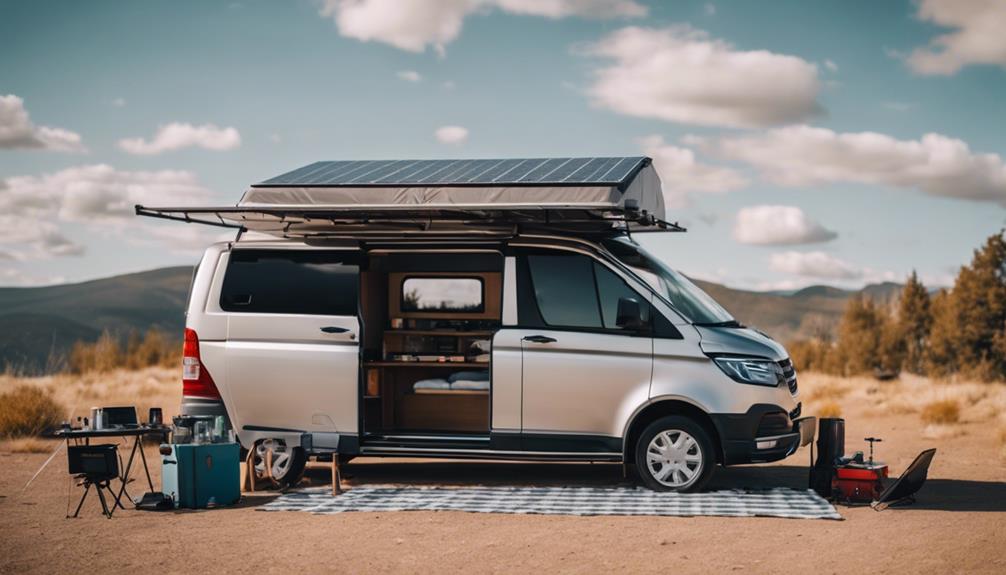
When you're planning your van conversion, consider using eco-friendly materials that not only reduce your carbon footprint but also enhance durability.
Innovative storage solutions can maximize your space and keep your essentials organized on the road.
These emerging technologies are transforming how you experience van life, making it more efficient and enjoyable.
Eco-Friendly Materials in Conversions
Increasingly, van lifers are turning to eco-friendly materials like bamboo, reclaimed wood, and recycled composites to create sustainable camper conversions that minimize their environmental impact. These sustainable alternatives not only enhance the aesthetics of your camper but also contribute to a healthier planet.
For insulation, consider using sheep's wool or denim, which are biodegradable and provide excellent thermal performance.
Incorporating solar panels into your design promotes renewable energy use, allowing you to power your devices while reducing your carbon footprint. Pair this with energy-efficient LED lighting to maximize your energy savings.
When it comes to finishing touches, opt for low-VOC paints and finishes, which greatly improve indoor air quality by minimizing harmful emissions.
Emerging technologies, such as bioplastics and natural fiber composites, offer lightweight options that help reduce the overall weight of your camper van conversions. By choosing these eco-friendly materials, you're not just building a cozy living space; you're also making a conscious decision to protect the environment.
Embrace these sustainable practices in your DIY camper conversion, and enjoy the journey toward a greener lifestyle.
Innovative Storage Solutions
Innovative storage solutions are revolutionizing van conversions, making it easier than ever to maximize every inch of space for your DIY camper. By utilizing modular storage systems, you can create customizable configurations that optimize both space efficiency and functionality. Smart storage solutions, like under-bed drawers and foldable shelving units, help you make the most of vertical space while keeping everything accessible and organized.
Incorporating innovative materials, such as lightweight composites, not only reduces the overall weight of your van but also enhances fuel efficiency without sacrificing durability. Collapsible furniture is another game-changer, allowing for multifunctional use without occupying valuable interior space when not needed.
Additionally, techniques for vertical space utilization, like hanging organizers and magnetic strips for tools, are essential for maintaining a tidy living area. Integrated smart home technology takes convenience to the next level, enabling you to control lighting, temperature, and storage access through mobile apps.
All these features come together to enhance your camper experience, ensuring you have a practical and enjoyable space that feels like home on the road.
Cost-Benefit Evaluation
When considering a DIY camper conversion, it's essential to weigh the costs against the benefits you'll gain.
You'll want to analyze the purchase price of different van models and how much you're willing to invest in materials and features.
Understanding the potential resale value and maintenance costs will also help you make a more informed decision.
Cost Vs. Benefits Analysis
A thorough cost-benefit analysis of DIY camper van conversions reveals that while initial expenses can vary widely, the long-term advantages often justify the investment.
Starting from around $5,000 to $10,000 for basic builds, DIY camper conversions allow you to customize space features according to your needs without the hefty price tag of professional conversions, which typically begin at $20,000.
You might consider investing in larger models like the Mercedes Sprinter or Ford Transit. Though these come with higher initial costs, the extra space and features can save you from future upgrades.
You'll also appreciate the long-term benefits, as well-executed conversions can enhance resale value, making these popular models retain their worth better than others.
However, don't overlook ongoing expenses. Maintenance expenses and fuel consumption can increase with larger or more complex conversions, affecting overall financial sustainability.
By weighing the cost vs. benefits carefully, you can make an informed decision that aligns with your lifestyle and budget.
Ultimately, a DIY camper conversion can be a rewarding investment that offers both freedom and value over time.
Professional Van Conversion Insights
Professional van conversions often provide a reliable solution for those seeking high-quality craftsmanship and adherence to safety standards. When you opt for a professional conversion, you're investing in a service that guarantees all gas, electrical, and plumbing systems comply with legal regulations. This peace of mind is invaluable compared to DIY projects, where safety may be overlooked.
One significant advantage of professional services is the wide range of customization options available. You can choose tailored designs that enhance both functionality and aesthetic appeal, maximizing space efficiency according to your specific needs. Whether you desire a minimalist setup or a luxurious living space, professionals can turn your vision into reality.
Moreover, the resale value of professionally converted vans often surpasses that of DIY builds. Popular models like the Mercedes Sprinter and Ford Transit retain their worth in the market due to their quality craftsmanship. This market demand means that your investment not only pays off during usage but also when it's time to sell.
Ultimately, choosing a professional conversion can make your dream camper not just a comfortable living space, but also a wise financial decision.
Cost Comparison of Van Models
Understanding the cost differences between various van models is vital for making an informed decision about your DIY camper conversion project. When considering the purchase costs, the Nissan NV averages around $30,140, while the Ford Transit comes in at approximately $34,510. This variation can greatly impact your budget as a DIY enthusiast.
Additionally, factor in conversion costs, which can range from $5,000 for basic setups to over $100,000 for more luxurious builds. Fuel efficiency is another important consideration; the Ford Transit Connect offers 25-28 MPG, while larger models like the Mercedes Sprinter can drop to 10-15 MPG, affecting long-term travel expenses.
Maintenance costs also play a role in your decision. Lower mileage vans (under 50,000 miles) typically incur fewer issues compared to those over 100,000 miles, which may require more frequent repairs.
Finally, resale value shouldn't be overlooked. Well-maintained models like the Ford Transit and Mercedes Sprinter tend to retain their value better, making them a smart investment for your camper conversion project.
Conducting a thorough model comparison will guarantee you choose the right van for your needs.
Essential Tools for Conversion
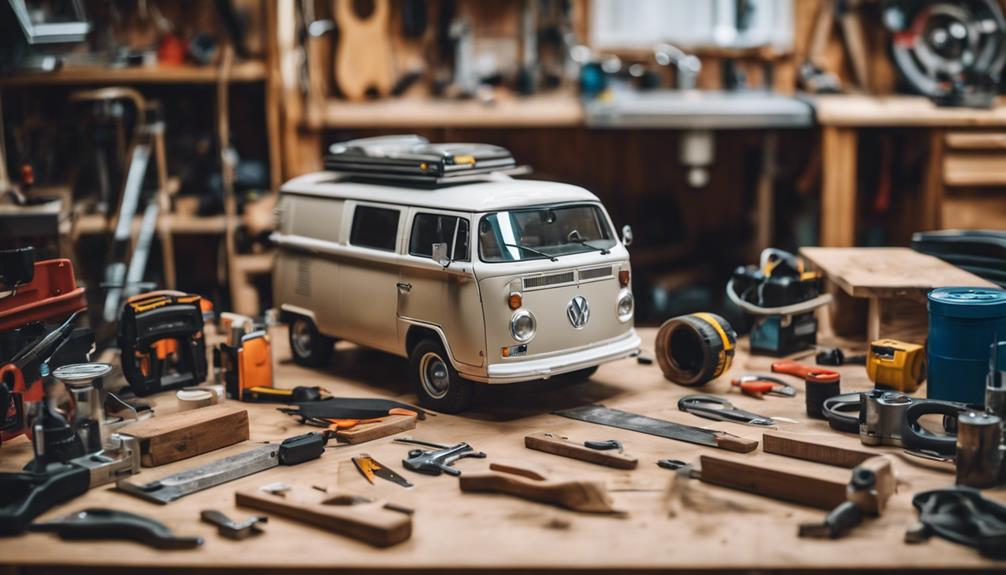
When you're gearing up for your DIY camper conversion, having the right tools makes all the difference.
You'll want to guarantee you prioritize safety while mastering the conversion process.
Let's explore the essential tools that will help you achieve a successful and safe transformation of your van.
Conversion Process Overview
To kick off your DIY camper conversion, you'll need some essential tools that will make the process smoother and more efficient.
First, a power drill is fundamental for assembly and installation tasks, allowing you to secure fixtures securely. A circular saw is crucial for cutting wood and other materials to size, enabling you to follow your conversion plans accurately. Don't forget a measure tape to guarantee precise measurements, which is crucial for maximizing the efficient use of space in your campervan conversion.
For intricate cuts around windows and curves, a jigsaw will come in handy. You'll also need a level to ensure that all surfaces are even during installation, making sure appliances and fixtures operate correctly. Investing in a multi-tool can boost your efficiency, handling multiple functions like cutting, sanding, and screwing with ease.
Lastly, always prioritize your safety. Equip yourself with safety gear like gloves, goggles, and a dust mask to protect against injuries and harmful particles while working on your DIY camper.
With these essential tools ready, you'll be well on your way to creating the perfect campervan for your adventures.
Safety Measures During Conversion
As you gather your tools for the DIY camper conversion, prioritizing safety measures is key to ensuring a smooth and injury-free process. Start by equipping yourself with essential safety gear. Always wear gloves, goggles, and a dust mask to protect against injuries and harmful particles when cutting materials or sanding surfaces.
A power drill will be essential for assembling furniture and securing fixtures, so keep it handy. Use a measuring tape to take precise measurements, ensuring all components fit snugly. A level is critical for installing cabinets and beds evenly, preventing future stability issues.
Don't forget a utility knife or multi-tool for versatile tasks, from trimming materials to opening boxes. When working at heights, a ladder or step stool will help you access the roof safely during insulation and installation.
Are European Vans Suitable for DIY Camper Conversions?
European vans are some of the best options for camper conversions. With their compact size and efficient designs, they are perfect for DIY projects. Whether it’s a VW Transporter or a Mercedes Sprinter, the best van camper conversion Europe can offer a versatile and comfortable mobile living space.
What Makes European Vans Suitable for DIY Camper Conversions?
The best van camper conversion europe options are perfect for DIY projects due to their spacious and well-designed interiors. European vans offer ample headroom, customizable layout options, and efficient use of space, making them suitable for turning into comfortable and functional camper vans.
Conclusion
Choosing the right van for your DIY camper conversion can make all the difference in your travel experience. When considering the best vans for camper conversions, popular models like the Ford Transit, Mercedes Sprinter, and Ram ProMaster stand out for their versatility and features. Each of these vans offers different interior space options, allowing you to create a layout that suits your needs.
While planning your conversion, budget considerations are vital. Conversion costs can range greatly, from $5,000 to over $100,000, depending on how elaborate you want to get. Keeping an eye on fuel economy is equally important; larger vans mightn't be as efficient, impacting your long-term travel expenses.
Don't forget to utilize available resources and community support, which can guide you through the DIY van conversion process. With the right planning and research, you can customize your camper to reflect your style while ensuring it meets all your needs.
Ultimately, taking the time to choose the right van will enhance your adventures and create lasting memories on the road. So, weigh your options carefully and get ready to hit the open road!
Frequently Asked Questions
What Is the Best Van to Convert to a Camper Van?
When choosing the best van to convert, consider your space needs, budget, and driving preferences. Options like the Mercedes Sprinter and Ford Transit offer reliability and customization, making them popular choices for your camper project.
What Is the Best Budget Van to Convert to Camper?
If you're looking for a budget-friendly van to convert, consider the Ford Transit Connect or Ram Promaster City. They offer good fuel economy and spacious interiors, making them perfect for your DIY camper project.
What Is the Most Reliable Used Conversion Van?
When looking for the most reliable used conversion van, you can't go wrong with the Ford Transit or Chevy Express. Both offer durability, extensive support, and parts availability, making them excellent choices for your needs.
How Much Does a DIY Campervan Conversion Cost?
A DIY campervan conversion typically costs between $5,000 and $10,000, depending on materials and design. Luxurious builds can exceed $100,000, so consider your budget and desired features before starting your project.
Conclusion
To sum up, choosing the best van for your DIY camper conversion can transform your adventures and create lasting memories.
By considering emerging technologies, evaluating costs, and gathering essential tools, you're well on your way to building your dream camper.
Embrace the journey, get your hands dirty, and let your creativity shine.
With the right van and a bit of effort, you'll have a cozy home on wheels ready for your next adventure.
Happy converting!

